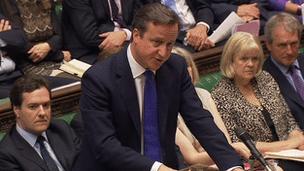David Cameron says Ulster Bank crisis 'unacceptable'
- Published

The prime minister told MPs that 'lessons must be learnt'
Prime Minister David Cameron has told the House of Commons that the crisis at the Ulster Bank is unacceptable.
Northern Ireland MPs met senior management at RBS to discuss the bank's problems.
They raised their concerns about the ongoing delays at the bank and the issue of compensation for those affected.
Customers at Ulster Bank are still affected by a computer failure at the bank's parent company RBS.
Service has been restored to RBS and NatWest customers but Ulster Bank is still experiencing problems over two weeks later.
Ulster Bank said in a statement on Wednesday that it hoped to have normal service returned by 16 July for most customers.
The bank said next week would be the last week of "significant delays".
Speaking in the Commons, in response to a question from the Strangford MP, Jim Shannon, Mr Cameron said: "I can quite understand why the honourable gentleman raises this on behalf of his constituents.
"What happened isn't acceptable. Clearly it's an operation matter for the bank, but the Financial Services Authority has been monitoring this very closely.
"My right honourable friend, the secretary of state for Northern Ireland spoke on Tuesday to the chairman of RBS, lessons must be learnt."
Compensation
Mr Shannon told MPs: "We the people have an 82 per cent share in RBS, therefore the government has a major say in what happens in the Ulster Bank in Northern Ireland."
Mr Cameron said he had received assurances that RBS would reimburse Ulster Bank customers for penalty charges or overdraft fees, or anything else that was incurred because of the difficulties.
Ulster Bank's chief executive Jim Brown said the technical issues were a lot more complex and difficult than they had originally expected.
"We have inconvenienced our customers, but we're trying to minimise the impact as much as we can by opening branches longer, and opening on weekends," he said.
"We've put 150 extra people into our call centres to take calls from customers as well. We're doing all that but the key really is to get on top of the IT issues and clear the backlog."
Mr Brown said staff were making "significant progress" in clearing the backlog.
"Based on the progress that we've made over the last few days, we expect to have the backlog cleared by 16 July," he said.
"We are seeing transactions coming through to customer accounts."
The delegation of Northern Ireland MPs want RBS to send more staff to Northern Ireland to help clear-up the backlog.
During the meeting, which was attended by DUP MPs, SDLP MPs, and the independent MP, Lady Sylvia Hermon, politicians urged RBS to put whatever resources were necessary in place to deal with the difficulties.
Speaking afterwards, the DUP deputy leader, Nigel Dodds, said it was a "robust meeting" and the MPs made their "frustration and anger clear".
The North Belfast MP said they raised the issue of compensation for customers with RBS officials and also raised the issue of compensation to non-Ulster Bank customers who had suffered as a result of the cash crisis.
Mr Dodds urged Mr Cameron to ensure that the taxation authorities showed flexibility with businesses and individuals whose finances had been disrupted by the bank crisis.
The prime minister said he would take up the matter with the chancellor George Osborne.
Hardships
Labour has called on the government to hold an emergency summit to help customers still affected by the technical problems.
Shadow Northern Ireland secretary Vernon Coaker urged the coalition to deal with the "crisis" facing families in the wake of the IT meltdown at RBS and NatWest.
"This is frankly a crisis, many families can't pay their mortgage, their rent, get their groceries, buy food, or put petrol in their car and older people can't get access to their pensions," he said.
Northern Ireland Office Minister Hugo Swire said the government was committed to ensuring the "sorry debacle" was cleared up quickly.
A technical failure on 19 June has affected many customers' accounts across the Royal Bank of Scotland (RBS) group since then.
The backlog at RBS and NatWest has been cleared but is still affecting thousands of Ulster Bank customers.
The RBS group said that Ulster Bank payments followed in sequence after those of NatWest and RBS due to the way the technology was set up when the three banks were integrated.
It said it "in no way" reflected any priority given to customers.
- Published4 July 2012
- Published4 July 2012
- Published3 July 2012
- Published3 July 2012
- Published2 July 2012
- Published2 July 2012
- Published2 July 2012